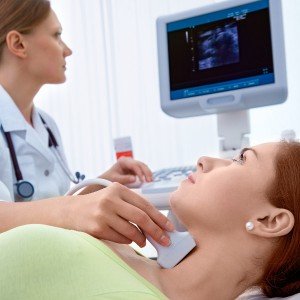The thyroid is a butterfly-shaped gland that is located at the base of the neck and is designed to produce hormones that regulate the body’s metabolism. Situated in the middle of the lower neck, the thyroid is characterized by two halves (lobes) which are joined by a small tissue bar. While you cannot always feel a normal thyroid gland, it plays an extremely important role for the body and for your overall health.
Thyroid disease is very common and affects millions of people worldwide. There are two main causes of thyroid disease that can be diagnosed by our ENT experts: an overproduction of thyroid hormones (hyperthyroidism) and underproduction of thyroid hormones (hyperthyroidism). Thyroid enlargement, also known as Grave’s disease, is another common thyroid disease that occurs in many people. Thyroid cancer is yet another problem that can be expertly diagnosed and evaluated by your ear, nose, and throat clinic.
|
|
Below you will find more detailed information on the most common types of thyroid disease our ear, nose and throat doctors located in Arlington, Dallas and Fort Worth, see.
- Hyperthyroidism – This signifies an overactive thyroid, which is often characterized with nervousness, palpitations, and weight loss. Grave’s disease is the most common form of hyperthyroidism.
- Hypothyroidism – This is characterized by an underactive thyroid and is a result of an insufficient amount of thyroid hormone. The most common cause of hypothyroidism is Hashimoto’s thyroiditis. Those who have this thyroid disease will experience fatigue, weight gain, difficulty with concentration, and possibly depression.
- Hypoparathyroidism – This thyroid disease is also referred to as low parathyroid activity, which may occur as a result of an autoimmune-related condition or treatment-induced injury.
- Thyroid Nodules/Goiter – A thyroid nodule is a growth on the thyroid. Additionally, a goiter is represented by a swelling of the thyroid gland itself. While thyroid nodules are typically benign, a small percentage are cancerous and will pose further risk down the line. Both thyroid nodules and goiters can be diagnosed by our ENT doctors with a combination of blood tests.
- Thyroid Cancer – Thyroid cancer is oftentimes recognized by a presence of thyroid nodules or swelling of the thyroid gland. We use various diagnostic techniques and an ultrasound to identify the specific type of thyroid cancer. A CT scan may also be used to determine type of cancer. Symptoms may include hoarseness, difficulty breathing and swallowing, neck pain, swollen lymph nodes, weight loss, and coughing.
|

